Iran Says to Maintain Naval Presence on High Seas to 'Secure Shipping'

Shahram Irani, the commander of Iran’s Navy, announced that it is a “permanent plan” of Iran's army to maintain a presence on all high seas of the world.

Shahram Irani, the commander of Iran’s Navy, announced that it is a “permanent plan” of Iran's army to maintain a presence on all high seas of the world.
“Currently, the Islamic Republic's naval fleet is present in the Gulf of Aden to support the security of shipping," Irani said Sunday, without referring to the fact that Tehran-backed Houthis have been attacking commercial vessels in the Red Sea and the Gulf of Aden since November.
Irani said that the Iranian Navy also assists ships from other countries in distress.
However, a recent incident highlighted a contradiction in Iran’s stated mission of aiding ships in distress. The United States Central Command (CENTCOM) reported on June 16 that the Iranian frigate IRIN Jamaran ignored distress calls from the Palauan-flagged, Ukrainian-owned bulk cargo carrier M/V Verbena after it was hit by two separate missile attacks by the Houthis.
“The Iranian frigate IRIN Jamaran was eight nautical miles from M/V Verbena and did not respond to the distress call.”
CENTCOM condemned the inaction of the Iranian vessel while referring to a pattern of "malign and reckless behavior" by the Iranian-backed Houthis, asserting that such actions "threaten regional stability and endanger mariners' lives across the Red Sea and Gulf of Aden."
In his Sunday remarks, Irani also referred to the presence of "enemy ships" in the area, saying it "does not advance their cause, and the damage inflicted on gigantic ships by the small group of Yemeni Houthis proves this point."
The statement comes amid an ongoing US-led multinational coalition military operation, initiated in December 2023, responding to Houthi aggression.
As proxies of Iran, the Houthis started targeting maritime commercial traffic in mid-November, following a call from Iran’s Supreme Leader Ali Khamenei for Muslim countries to blockade Israel. Initially confined to the Red Sea, these attacks subsequently extended into the Indian Ocean.